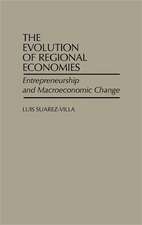Globalization and Technocapitalism: The Political Economy of Corporate Power and Technological Domination
Autor Luis Suarez-Villaen Limba Engleză Paperback – 28 noi 2016
| Toate formatele și edițiile | Preț | Express |
|---|---|---|
| Paperback (1) | 469.34 lei 6-8 săpt. | |
| Taylor & Francis – 28 noi 2016 | 469.34 lei 6-8 săpt. | |
| Hardback (1) | 1059.45 lei 6-8 săpt. | |
| Taylor & Francis – 28 feb 2012 | 1059.45 lei 6-8 săpt. |
Preț: 469.34 lei
Nou
Puncte Express: 704
Preț estimativ în valută:
89.80€ • 93.77$ • 74.16£
89.80€ • 93.77$ • 74.16£
Carte tipărită la comandă
Livrare economică 15-29 aprilie
Preluare comenzi: 021 569.72.76
Specificații
ISBN-13: 9781138271661
ISBN-10: 1138271667
Pagini: 250
Dimensiuni: 156 x 234 x 13 mm
Greutate: 0.45 kg
Ediția:1
Editura: Taylor & Francis
Colecția Routledge
Locul publicării:Oxford, United Kingdom
ISBN-10: 1138271667
Pagini: 250
Dimensiuni: 156 x 234 x 13 mm
Greutate: 0.45 kg
Ediția:1
Editura: Taylor & Francis
Colecția Routledge
Locul publicării:Oxford, United Kingdom
Notă biografică
Luis Suarez-Villa is Professor of Social Ecology, of Planning Policy and Design, and of Technology Studies at the University of California, Irvine, USA.
Recenzii
'We hear about the "knowledge economy", watch the processes of financialization wreak havoc, grow concerned about the increasing involvement of corporations in all aspects of life. Suarez-Villa shows how these phenomena of 21st century capitalism are related, connecting them into a powerful theoretical framework. Refreshingly clear despite the nuanced and sophisticated analyses he develops his work is well-grounded in careful research and the broader literature. This is a ground-breaking work delivering a theory of contemporary capitalism that is at once original, persuasive, elegantly articulated, and likely correct.' - Joel Bakan, University of British Columbia, Canada
'Globalization and Technocapitalism is a must-read for anyone concerned with understanding the crisis of contemporary capitalism. Luis Suarez-Villa has combined immense research with acute analysis to produce one of the most important books in years.' Robert W. McChesney, University of Illinois at Urbana-Champaign, USA 'Globalization and Technocapitalism provides a systematic critical analysis of the global commodification of intangibles, and clearly demonstrates how global capitalism is entangled with science and technology. The book is timely, as one way of digging ourselves out of the economic crisis is claimed to be growth.' - LSE Review of Books blog
'Globalization and Technocapitalism is a must-read for anyone concerned with understanding the crisis of contemporary capitalism. Luis Suarez-Villa has combined immense research with acute analysis to produce one of the most important books in years.' Robert W. McChesney, University of Illinois at Urbana-Champaign, USA 'Globalization and Technocapitalism provides a systematic critical analysis of the global commodification of intangibles, and clearly demonstrates how global capitalism is entangled with science and technology. The book is timely, as one way of digging ourselves out of the economic crisis is claimed to be growth.' - LSE Review of Books blog
Cuprins
Introduction; 1: Technocapitalism on a Global Scale; 2: Fast Accumulation; 3: Intangible Global Commodities; 4: The New Global Corporatism; 5: The Haves and the Have-nots; 6: Illusive Democracy; 7: Is There Any Alternative?
Descriere
As technological creativity, corporate research, and talent flows become more important than ever, Globalization and Technocapitalism explores the manner in which globalization acquires new contextual features that will become central to the macro-social dynamics of the twenty-first century. It thus sheds light on the resultant growth in global inequalities and more intrusive forms of global domination that are grounded in emerging sectors, its diverse fields and related advances in computing and telecommunications.












